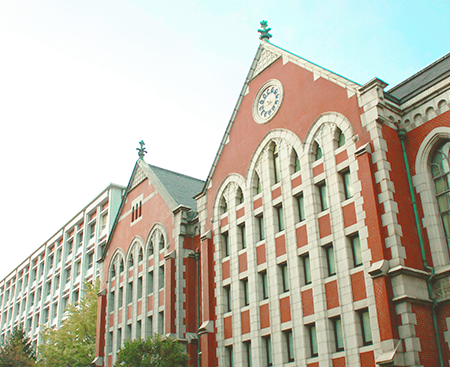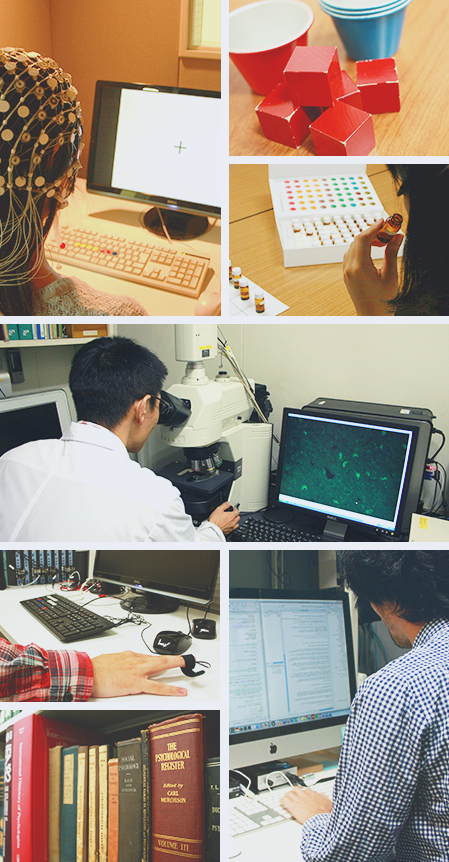Outline/Curriculum
History
At the Keio University Department of Psychology, the first laboratory was established by Matsusaburo Yokoyama in September 1926. It was officially incorporated into the Faculty of Letters in 1928. After World War II, the Graduate school (Psychology major, Department of Social Sciences) was established in 1951 and an animal laboratory was also established in 1952. The Hiyoshi Campus laboratory was opened as well around the same time. Many students and scientists have graduated from the Department. Over time, we have experienced relocation of the Laboratory rooms and laboratories, as well as reorganization of the curriculum. However, the core of our research and educational philosophy has consistently been the performance of meticulous experiments and rigorous analysis of data in our efforts to pursue Psychology, ever since the inception of the Department. Currently, we are engaged in research and education in various fields of Psychology, including perception, behavior, cognition, development, biology, and neuroscience. We are unique among Departments of the Faculty of Letters in that we adopt experimental and scientific approaches.

Undergraduate Curriculum
Based on the philosophy of evidence-based psychology, sophomore and junior students of the Undergraduate school learn research methodology and gain knowledge about evidence-based Psychology in a stepwise manner. Senior students conduct experiments for their own research projects and finalize their graduation thesis. To ensure completion of the educational program, the number of students enrolled each year is restricted to 25 at our Department so that we can provide in-depth education.
Sophomore students
The main goal of sophomore students is acquisition of basic knowledge about psychology. Basic knowledge is provided in the areas of Perceptual Psychology, Cognitive Psychology, Learning and Behavior, Developmental Psychology, and Physiological Psychology and Neuropsychology. And the basic skills required to perform psychological research are acquired in Research Methods of Psychology, Psychological Statistics, and Academic Readings in Psychology. These are all required subjects.
Junior students
The main objective of junior students is the acquisition of expert knowledge and skills. The most important compulsory unit is Laboratory Course in Psychology. Students are organized into a small number of groups and participate in experiments in various fields. Data are analyzed and summarized in reports. Through this process, students gain knowledge about measurement methods, equipment control, programming, data analysis, and preparation of experimental reports. Students act as both experimenters and subjects at the same time. Thus, they obtain hands-on experience with psychological research in various fields. Experimental reports must be submitted each time and this provides important practice for preparation of the graduation thesis. Students also learn integrated psychological knowledge in History of Psychology. There are many other subjects of psychology, which present in-depth knowledge about each field, and students can select some of them. In addition, students take part in Intensive Seminar of Psychology organized by the faculty and present literature that has attracted their interest. In addition, they are exposed to graduate research presentations by senior students. These activities help them to prepare for research in the senior year.
Senior students
Senior students conduct their own experiments and research based on their undergraduate learning and prepare a graduation thesis. Students continue to participate in Intensive Seminar of Psychology as part of course work and learn special selected subjects.

Graduate Curriculum
The Graduate School Psychology major program belongs to the Graduate School of Human Relations. Both Master’s and Doctoral programs are available. The curriculum includes highly specialized lectures and exercises. Considerable emphasis is placed on research. Graduate students are expected to prepare to plan their own research and/or participate in the research programs of faculty members. By experiencing many research activities, the skills and training required to function as a scientist will be acquired. At the end of the program, each graduate student prepares a Master’s Thesis or Doctoral Thesis. There is a unique part of the Master’s Program called “Special Experimental Psychology.” This allows graduate students to participate in “Experimental Psychology” for undergraduates as research instructors. By providing instructions and education to undergraduates, graduate students can consolidate what they have learned so far and practice the skills needed to become a psychology teacher.
Research facilities
The core research facilities of the program are at the following three locations: 1) the Psychology Research Laboratory in Mita, 2) the Animal Experimental facility in Tsuna-machi, and 3) the Psychology Research Laboratory in Hiyoshi. In addition, there are several practice rooms and the laboratory of the Graduate School of Human Relations in the South Annex Building at Mita.
Number of students (2024)
| Year | number |
|---|---|
| Sophomore | 32 |
| Junior | 31 |
| Senior | 27 |
| Total | 90 |
| Program | number |
|---|---|
| Master’s Program | 12 |
| Doctoral Program | 8 |
